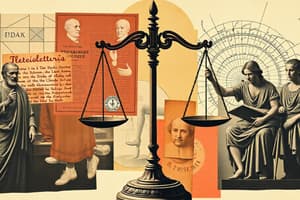Podcast
Questions and Answers
What identity concept is primarily promoted in individualism?
What identity concept is primarily promoted in individualism?
- They identity
- We identity
- You identity
- I identity (correct)
Which of the following is NOT a key feature of individualism?
Which of the following is NOT a key feature of individualism?
- Emphasis on communal goals (correct)
- Promotion of individual rights
- Striving for personal success
- Independence in actions
How are Eastern traditions primarily characterized in relation to the self?
How are Eastern traditions primarily characterized in relation to the self?
- They reject any connection to nature.
- They are solely focused on individual rights.
- They are seen as collectivistic. (correct)
- They promote independence above all.
What is a common perception in individualistic cultures regarding reliance on others?
What is a common perception in individualistic cultures regarding reliance on others?
Which philosophy asserted the relevance of the self in relation to society and nature among Eastern traditions?
Which philosophy asserted the relevance of the self in relation to society and nature among Eastern traditions?
What principle governs the unconscious according to the content?
What principle governs the unconscious according to the content?
Who introduced the theory of self that includes 'self', 'me', and 'I'?
Who introduced the theory of self that includes 'self', 'me', and 'I'?
How does the sociological perspective define the 'self'?
How does the sociological perspective define the 'self'?
What role does language play in the development of self?
What role does language play in the development of self?
According to the content, what process helps develop consciousness in the self?
According to the content, what process helps develop consciousness in the self?
What does the development of the self require interaction with?
What does the development of the self require interaction with?
What is the term used to describe the 'aspects of ourselves that are constituted by societal expectations'?
What is the term used to describe the 'aspects of ourselves that are constituted by societal expectations'?
Which of the following is NOT a component of the interaction that shapes the self?
Which of the following is NOT a component of the interaction that shapes the self?
What does the 'I' represent according to William James?
What does the 'I' represent according to William James?
Which type of self refers to internal standards and private thoughts?
Which type of self refers to internal standards and private thoughts?
How is self-awareness defined in the provided content?
How is self-awareness defined in the provided content?
What influences an individual's interests according to the content?
What influences an individual's interests according to the content?
What is one possible outcome of having a negative self-awareness?
What is one possible outcome of having a negative self-awareness?
What is the function of the 'ME' in the context provided?
What is the function of the 'ME' in the context provided?
Which of the following statements is NOT true about self-awareness?
Which of the following statements is NOT true about self-awareness?
What aspect is suggested to reconsider when outperformed in a skill?
What aspect is suggested to reconsider when outperformed in a skill?
What is the view of J. Maurice Merleau-Ponty regarding the relationship between mind and body?
What is the view of J. Maurice Merleau-Ponty regarding the relationship between mind and body?
Which of the following describes C. Sobritchea's concept of self?
Which of the following describes C. Sobritchea's concept of self?
According to Freud, which level is governed by the reality principle?
According to Freud, which level is governed by the reality principle?
What does the term 'private self' refer to in the context of types of self?
What does the term 'private self' refer to in the context of types of self?
What aspect of self is NOT included in Freud's model of conscious and unconscious?
What aspect of self is NOT included in Freud's model of conscious and unconscious?
Which philosopher argues that the mind-body bifurcation is an invalid problem?
Which philosopher argues that the mind-body bifurcation is an invalid problem?
In the context of socialization, the 'collective self' is best described as:
In the context of socialization, the 'collective self' is best described as:
What is the primary function of the subconscious level in Freud's theory?
What is the primary function of the subconscious level in Freud's theory?
According to Plato, what is the relationship between the soul and the body?
According to Plato, what is the relationship between the soul and the body?
What did C.St. Augustine admit about himself?
What did C.St. Augustine admit about himself?
What does the core of knowledge according to the content focus on?
What does the core of knowledge according to the content focus on?
Which of the following statements best reflects Plato's belief about the body?
Which of the following statements best reflects Plato's belief about the body?
According to the content, what can impact human choices?
According to the content, what can impact human choices?
What is a key characteristic of humans according to the content?
What is a key characteristic of humans according to the content?
What tragic event influenced C.St. Augustine as mentioned in the content?
What tragic event influenced C.St. Augustine as mentioned in the content?
In the content, what role does knowledge of the self play in making choices?
In the content, what role does knowledge of the self play in making choices?
Study Notes
Justice
- Derived from the soul, human choices are based on the desire for happiness.
- The more a person knows about themselves, the better their choices.
- Saint Augustine of Hippo believed that even if he was mistaken in his judgments, he was still correct.
- Augustine's life was marked by a series of misfortunes, including the death of his father and a lack of educational opportunities.
- He acknowledged his own sinfulness and was not afraid to discuss it with others.
- Augustine saw human nature as bifurcated, with a body that is mortal and seeks divine connection and a lively, vivid soul.
Plato
- Plato was a dualist, believing in the separation of the soul (immaterial, knowing, and comprehending forms) and the body (material).
- He argued that the soul exists both before and after death.
- He advocated for focusing on the soul, rather than the body, as the driving force behind our identity.
- Plato believed that the body is dependent on the soul.
Eliminative Materialism
- This theory aims to develop a new neuroscience-based vocabulary for understanding the mind, consciousness, and human experience.
Understanding the Self
- The self is often viewed as separate, self-contained, independent, consistent, unitary, and private.
- However, the self is also shaped by social interactions and the way we see ourselves in relation to others.
- Our understanding of the self evolves throughout life, culminating in a distinct personal identity.
Self-Types
- Private self: comprises the individual's traits, states, or behaviors.
- Public self: the generalized view of the self held by others.
- Collective self: the self's identity within a particular group or community.
Socialization
- Socialization involves all social and cultural processes through which individuals develop or learn about their identities within the context of societal norms, values, gender roles, and sexual relationships.
George Herbert Mead
- Mead believed that the self emerges from social interaction.
- He proposed the concepts of "self", "me", and "I".
- According to Mead, the self is developed through social interaction.
Sociological Perspective of the Self
- Self is a product of social interactions.
- The self is not innate but emerges through our social experiences.
Self and External Reality
- Social situations influence our understanding of ourselves.
- Growth and development of the self are based on interactions with the external world.
Perception
- Self-perception is established through observations and interactions with others.
Self (Cooley, 1902)
- Self includes any statements made by an individual, explicitly or implicitly, that use the terms "I", "me", and "myself".
“I” vs. “Me”
- “I” is the thinking and feeling self, responsible for acting and making decisions.
- “Me” refers to an individual's physical characteristics and psychological capabilities that make up their identity.
William James’ "I"
- The self as the knower, also known as pure ego.
Self (Carver and Scheier, 1981)
- Two types of self: private and public.
- Private Self: internal standards, thoughts, and feelings.
- Self has no time to be weak and emotional: This is the time to reconsider what was outperformed, strengthen the resolve to improve the skill, and recover from being emotional.
Eastern Traditions
- Associated with communal self, where the self is defined by its relationship to others and the broader community.
Individualism vs. Collectivism
- Individualism:
- Emphasizes the "I" identity.
- Promotes individual goals, initiatives, and achievements.
- Prioritizes individual rights.
- Values independence and self-reliance.
- Collectivism:
- Grounded in nature and interconnectedness.
- Emphasis on group goals, interdependence, and harmony.
- Focus on social responsibility and collective well-being.
Eastern Thought
- The self's relationship to others, the Divine Being, and nature are central to Eastern traditions.
Confucianism
- Confucius emphasized ethics, social order, and living in harmony with the natural world.
Self-Awareness
- Self-awareness involves being cognizant of our self concept.
- It can be both positive and negative, depending on the circumstances and our subsequent actions.
Studying That Suits You
Use AI to generate personalized quizzes and flashcards to suit your learning preferences.
Related Documents
Description
Explore the contrasting views of Saint Augustine and Plato on justice and the nature of the soul. This quiz delves into Augustine's personal experiences and Platonian dualism, highlighting how these philosophical ideas shape our understanding of identity and morality. Test your comprehension of their theories and insights.




